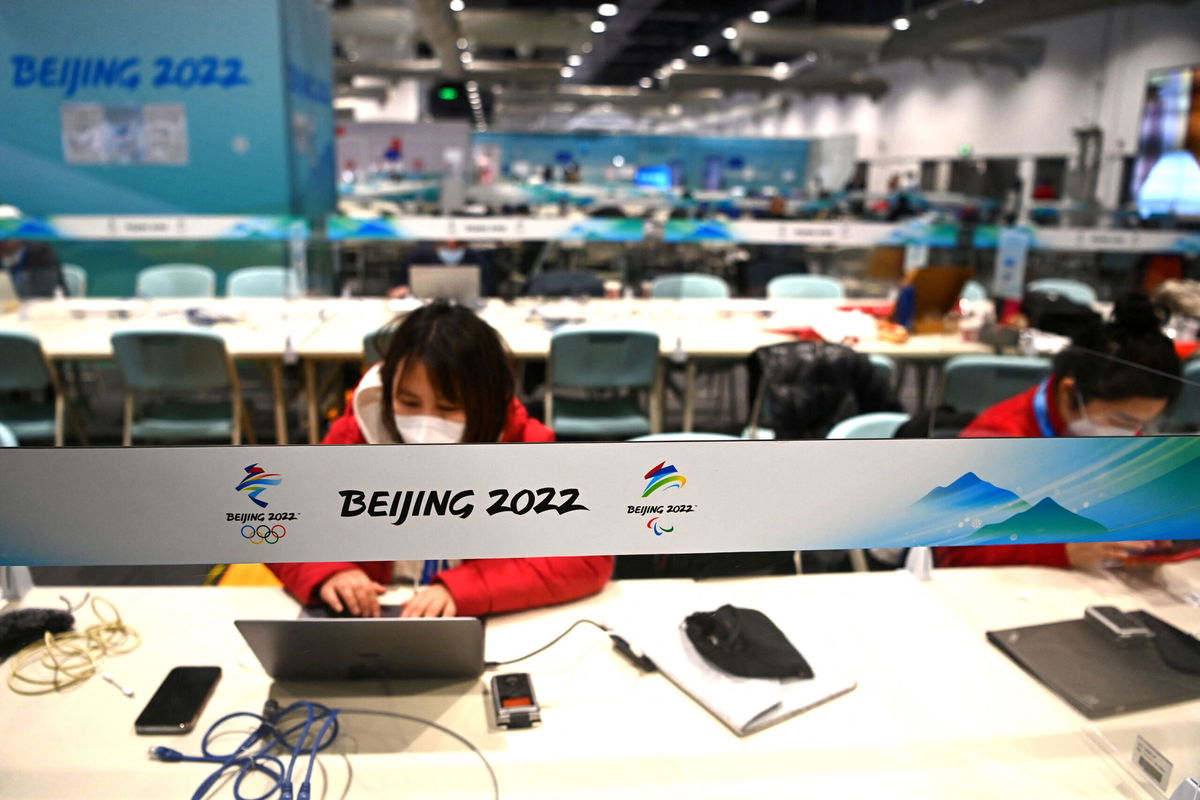From visa denials to online trolling, foreign journalists in China say they face ‘unprecedented hurdles’

Foreign journalists in China say they face 'unprecedented hurdles.' Pictured is the main media center for the Beijing Winter Olympics on January 31
By Diksha Madhok, CNN Business
China’s government is using new intimidation methods against journalists and their sources, according to an annual survey by the Foreign Correspondents’ Club of China.
The report, which was released Monday, said foreign correspondents are facing “unprecedented hurdles” covering the world’s most populous nation. Those hurdles include online trolling, cyber hacking, visa denials and physical assaults.
Almost all the foreign journalists surveyed said that reporting conditions in China did not meet what they considered to be international standards. The survey was conducted in December 2021, and includes responses from 127 of 192 correspondent members representing news organizations globally.
As the Chinese government continues “to block and discredit independent reporting,” covering one of the world’s most important economies is “increasingly becoming an exercise in remote reporting,” the report said.
The survey comes just days before the start of the Winter Olympics in Beijing. Declining media freedoms have made coverage of the event challenging for news organizations around the world.
Foreign media companies in China are operating under “critical labor shortages” as authorities have “failed to grant new credentials to numerous journalists seeking to begin assignments, citing the pandemic and geopolitical tensions,” the report said. The government has, however, issued other types of visas — including business visas — to foreigners, the report added.
As many as 46% of respondents said that their bureaus were understaffed due to their inability to bring in the required number of journalists.
News organizations headquartered in the United States have been suffering since China expelled numerous journalists working for American news companies in early 2020. At the time, Beijing had insisted that it was forced to retaliate after the Trump administration designated US branches of China’s state media outlets as “foreign missions,” and capped the number of Chinese journalists working for those outlets in the United States.
American news organizations affected by the Chinese expulsions included the New York Times, the Washington Post and the Wall Street Journal.
Last November, the two countries agreed to relax some visa restrictions on each other’s journalists. However, as of the end of 2021, “China had yet to grant visas to the handful of US journalists promised under the agreement,” the report noted.
China’s Foreign Ministry didn’t immediately respond to a request for comment.
When asked about an earlier FCCC statement that highlighted harassment of foreign journalists in China, a Foreign Ministry spokesman rejected the allegation and insisted China’s reporting environment is “open and free.”
“As long as foreign journalists abide by the law and do reporting in compliance the law and regulations, there is no need to worry,” Zhao Lijian said in July.
The country’s Covid-19 restrictions have hampered not just the visa process, but also the work of journalists on the ground. Sudden lockdowns remain common across China, prompting reporters to cancel or postpone trips, the survey found. More than half the respondents said “they were told to leave a place or denied access for health and safety reasons when they presented no risk.”
Authorities have frequently invoked “Covid prevention measures as a supposed reason to turn down interviews and block access for journalists,” the report said. This includes blocking access to sensitive regions such as Xinjiang, where reporters have attempted to cover allegations of human rights abuses against Uyghurs and other ethnic minorities.
This wasn’t the only tactic used to discourage reporting in the region. Nearly 90% of the journalists who traveled to Xinjiang last year said that they were “visibly followed, often by men in plainclothes.”
The Chinese authorities have also cracked down on sources, the report said. Chinese sources are routinely threatened by police and forced to cancel interviews at the last minute. Journalists are also struggling with shrinking access to academics, think tanks and employees of both state-owned and private enterprises, where approval is required from higher-ups in order to speak to foreign reporters.
Meanwhile, a quarter of respondents said they were targeted online as a result of their reporting in China. The report said that organizations — including the BBC, NPR, and the Economist — have been “attacked by state-linked entities, state media, and anonymous social media accounts for their reporting.”
“Such campaigns have fostered a growing feeling among the Chinese public that foreign media are the enemy and directly encourage offline violence and harassment of journalists in the field,” the FCCC said in a press release on Monday.
“Foreign journalists and their families are being harassed so severely by the state that a handful of correspondents, demoralized and under attack, have simply left mainland China.”
— CNN’s Beijing Bureau contributed to this report.
The-CNN-Wire
™ & © 2022 Cable News Network, Inc., a WarnerMedia Company. All rights reserved.